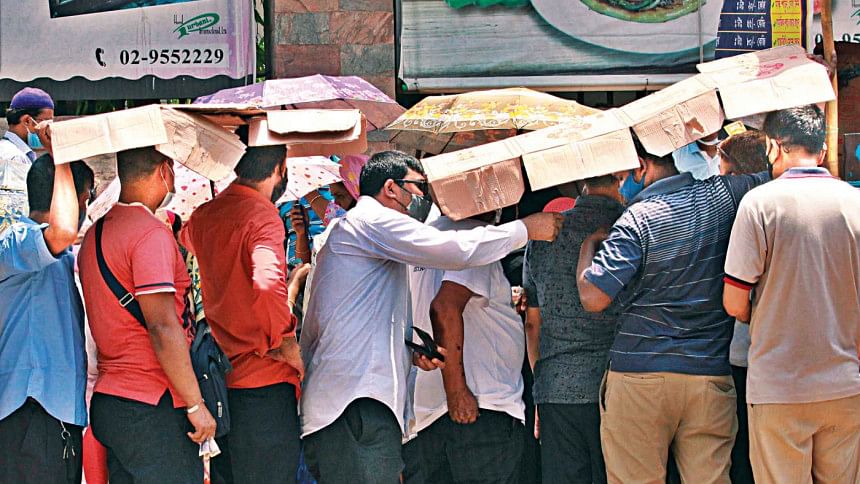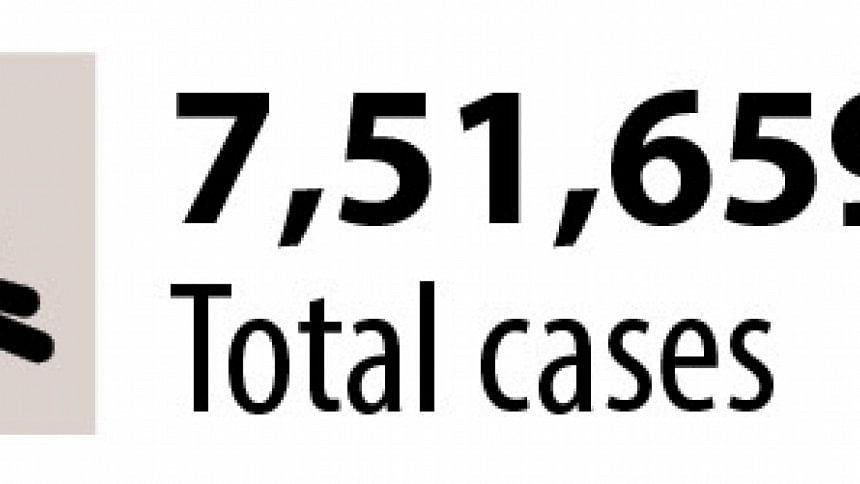Lockdown Fallout: City poor barely on govt’s mind

Over the last couple of weeks, Abdus Sobhan, a day labourer in the capital, saw his earnings drop to almost nothing.
With the government-imposed restrictions taking effect on April 14, the 40-year-old man, who crushes bricks and moves soil at construction sites, could hardly manage any work to make a living.
With very little income and no help around, he is worried about his survival in the city in the coming days as the government extended the restrictions till May 5.
"I have my elderly parents at my village home to look after. But if I cannot earn, how would I feed my family? Sobhan, who has been living in a slum in the city's Mirpur area for nearly seven years, told this newspaper yesterday.
"Before the lockdown, I used to earn Tk 600-800 a day. But I could earn only Tk 300 in the last four days. I heard the government is giving food aid, but I haven't yet got any. How will people like us survive in the capital without any work or government assistance?" asked the helpless man.
Like him, thousands of poor people in urban areas, who couldn't find any work or source of income during the lockdown, remain deprived of the benefits of the government's social safety net schemes.
Many of these economically vulnerable people in urban areas with little or no savings to fall back upon had no choice but to leave for village homes during the lockdown imposed to curb the rapid spread of Covid-19.
Rural areas have always been the focus of safety net programmes. Though the government has made considerable progress in expanding the social safety net over the years, the country's urban poor have negligible access to the benefits.
A government survey in December last year revealed that the social safety net schemes fail to cover millions of urban people facing food insecurity.
The open market sale (OMS), a subsidised food distribution programme, for example, covers only 1 percent of the poor urban households while 2 percent urban poor are supported by old-age allowance, said the survey conducted by Bangladesh Bureau of Statistics (BBS).
"Despite the government's commitment to uplifting the poor, there is a lack of social safety net programmes for urban poor. Available information suggests that millions of food insecure urban people still remain uncovered," said the survey titled "Urban Socioeconomic Assessment Survey (USAS) 2019".
The BBS surveyed 2,150 households in city corporation areas across the country from December 8 to 26 last year. But the study, the first of its kind, did not reflect the impact of the Covid pandemic.
There are around 81 lakh beneficiaries under the programmes which include OMS, income security for the elderly, widows, and persons with disabilities, and pension schemes for retired government employees and their families.
According to an estimate of the BIDS, the countrywide shutdown caused 80 percent drop in income of the people belonging to the labouring class in urban areas and 10 percent drop in income of the same segment of population in rural areas.
Bangladesh Institute of Development Studies (BIDS) prepared the report titled "Poverty in the time of Corona: Trends, Drivers, Vulnerability and Policy Responses in Bangladesh" in June last year to assess the fallout of the Covid-induced shutdown.
NO GOOD NEWS FOR URBAN POOR
With the ongoing restrictions extended till May 5, there is no good news for the urban poor this time as the government decided not to sell rice at a subsidised rate (Tk 10 a kg) through its OMS outlets.
Food ministry officials said the government made such a decision because of the dwindling food stock.
Food Secretary Mosammat Nazmanara Khanum said the government is continuing open market sale of coarse varieties of rice for Tk 30 a kg from 874 trucks across the country.
"We have informed the finance ministry that we will not be able to sell rice at Tk 10 per kg through OMS because of the dwindling food stock. The government has to give cash incentives instead of rice," she told The Daily Star.
The government's food reserve dwindled to 4.62 lakh tonnes on April 20. In July last year, it had a rice stock of 11.20 lakh tonnes, which was 15.99 lakh tonnes on July 1, 2019.
The food secretary further said the government had sold 86,000 tonnes of rice at Tk 10 per kg through the OMS in city corporation areas all over the country from April to June last year.
Last year's BBS survey found that the existing safety net portfolio has grown in an unplanned manner with duplication resulting from incorrect targeting, leakage and a lack of coordination.
"There are several effective social safety nets in urban areas, yet the coverage is negligible," it pointed out.
NEED FOR DATABASE, GOVT-NGO COLLABORATION
Experts say the pandemic and the lockdown have exacerbated the pre-existing inequities in the safety net coverage with exposure being significantly higher in rural areas than the urban ones.
The rural people have some scopes such as farming and small sales of farm products. But the urban poor have to buy everything with price hike of essentials adding to their woes amid a decline in their income, they mentioned.
The experts stressed the need for designing a social security system for the urban poor, keeping in mind the rapid urbanisation and sharp increase in the number of slum dwellers. Participation of local government bodies and non-government organisations is also vital to reach the target population.
Noted economist Binayak Sen thinks the poor people in urban areas do not get the benefits of social safety programmes for a lack of comprehensive household database.
If there is a database, the government could reach the beneficiaries during this pandemic, he noted.
Binayak, director general of the BIDS, said social protection programmes should be carried out through coordinated efforts involving both government and non-government organisations.
"Our strength is GO-NGO collaboration. And the cooperation and collaboration have become all too important at this crucial time of pandemic," he told The Daily Star.
There are many NGOs working in urban areas, he said, adding that it will be possible to reach the target population in these areas if the NGOs are involved in the government's safety net schemes.
Contacted, Md Mohsin, secretary at the disaster management and relief ministry, admitted that poor people in urban areas do not get much of the safety net facilities.
"The government has made allocations for those affected by the pandemic and the lockdown. Part of it is being earmarked for the urban poor no matter how nominal the allocation is," he mentioned.
The secretary said they are taking measures this time so that the urban poor are not deprived of the facilities.
"We are now roping in the representatives of city corporations and other local government bodies to develop distribution mechanisms as they are the ones who can help us reach the target population."
Asked about involving NGOs in safety net schemes, Mohsin said the government has no plan in this regard at this moment.



 For all latest news, follow The Daily Star's Google News channel.
For all latest news, follow The Daily Star's Google News channel. 



Comments